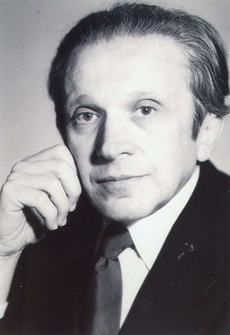December 3, 2018. Mieczysław Weinberg. The Polish-Jewish-Soviet composer Mieczysław Weinberg is known by many names: his first name is sometimes spelled Moisey, his last name  Vainberg, Vajnberg or Vaynberg. The problem is that, no matter how his name is spelled, the public doesn’t know his music. It’s a pity, as he deserves better. He was born Mojsze Wajnberg on December 9th of 1919 into a Jewish family in Warsaw. His father wrote music for Yiddish theaters. His mother was an actress in the same theaters. Mojsze (or Mieczysław in Polish) studied piano at the Warsaw Conservatory, graduating in 1939. On September of that year the Nazis entered Poland starting WWII and Weinberg fled to the Soviet Union. It was often the case at the time that Jewish families sent their older sons away first, hoping to join them later. Unfortunately, his parents and younger sister never made it out of Poland and eventually perished in a concentration camp. Weinberg settled in Minsk and went to the local Conservatory, where he studied composition. In 1941 Germany attacked the Soviet Union; the Minsk Conservatory was evacuated to Central Asia and Weinberg found himself in Tashkent. There, he met and eventually married Natalia Vovsi, daughter of the famous Yiddish actor and director Solomon Mikhoels (Mikhoels was his stage name, he was born Shloyme Vovsi). In 1943 Weinberg sent the score of his First Symphony to Dmitry Shostakovich. Shostakovich was impressed and arranged for Weinberg to be invited to Moscow; they soon became good friends.
Vainberg, Vajnberg or Vaynberg. The problem is that, no matter how his name is spelled, the public doesn’t know his music. It’s a pity, as he deserves better. He was born Mojsze Wajnberg on December 9th of 1919 into a Jewish family in Warsaw. His father wrote music for Yiddish theaters. His mother was an actress in the same theaters. Mojsze (or Mieczysław in Polish) studied piano at the Warsaw Conservatory, graduating in 1939. On September of that year the Nazis entered Poland starting WWII and Weinberg fled to the Soviet Union. It was often the case at the time that Jewish families sent their older sons away first, hoping to join them later. Unfortunately, his parents and younger sister never made it out of Poland and eventually perished in a concentration camp. Weinberg settled in Minsk and went to the local Conservatory, where he studied composition. In 1941 Germany attacked the Soviet Union; the Minsk Conservatory was evacuated to Central Asia and Weinberg found himself in Tashkent. There, he met and eventually married Natalia Vovsi, daughter of the famous Yiddish actor and director Solomon Mikhoels (Mikhoels was his stage name, he was born Shloyme Vovsi). In 1943 Weinberg sent the score of his First Symphony to Dmitry Shostakovich. Shostakovich was impressed and arranged for Weinberg to be invited to Moscow; they soon became good friends.
In January of 1948 his father-in-law, Solomon Mikhoels, one of the most prominent Jews of the Soviet Union, the chairman of the Jewish Anti-Fascist Committee who traveled the world encouraging support for the Soviet Union, was assassinated on Stalin’s orders. The murder was covered up as a road accident. At the time of Stalin’s campaign against “cosmopolitanism” (read anti-Jewish, antisemitic campaign) that followed, all prominent Jews were at risk. Weinberg was no exception: in February of 1953 he was arrested as a “Jewish bourgeois nationalist” and sent to the Gulag. Shostakovich, who wasn’t known for his civic courage, sent a letter to Lavrentiy Beria pleading his friend’s innocence (it didn’t help). Weinberg and many other Jews were saved by Stalin’s sudden death in March of 1953. Weinberg was allowed to return to Moscow. His family found a place not far from Shostakovich’s apartment; they visited each other often. Weinberg continued composing; his work, championed by Shostakovich, was also endorsed by several prominent performers and conductors, among them Emil Gilels, Leonid Kogan, Mstislav Rostropovich, Rudolph Barshai and Kirill Kondrashin. Weinberg died in Moscow on February 26th of 1996; shortly before death he converted to Orthodox Christianity.
Weinberg is sometimes dismissed as the “smaller Shostakovich.” It’s true that he borrowed some idioms from his great compatriot and in some pieces quoted him directly, but Weinberg was a talented original composer, a wonderful melodist also capable of sophisticated orchestration. He wrote seven operas; the best known, The Passenger, has been staged at the English National Opera, the Lyric Opera of Chicago and many other stages. He also wrote 22 symphonies and many chamber works. Here’s the second movement, Lento, from Weinberg’s Symphony no. 1, composed in 1942 in Tashkent, the one that so impressed Shostakovich. Gothenburg Symphony Orchestra is conducted by Thord Svedlund.
| Source: | https://www.classicalconnect.com/node/12803 |
| Website: | Classical Connect |